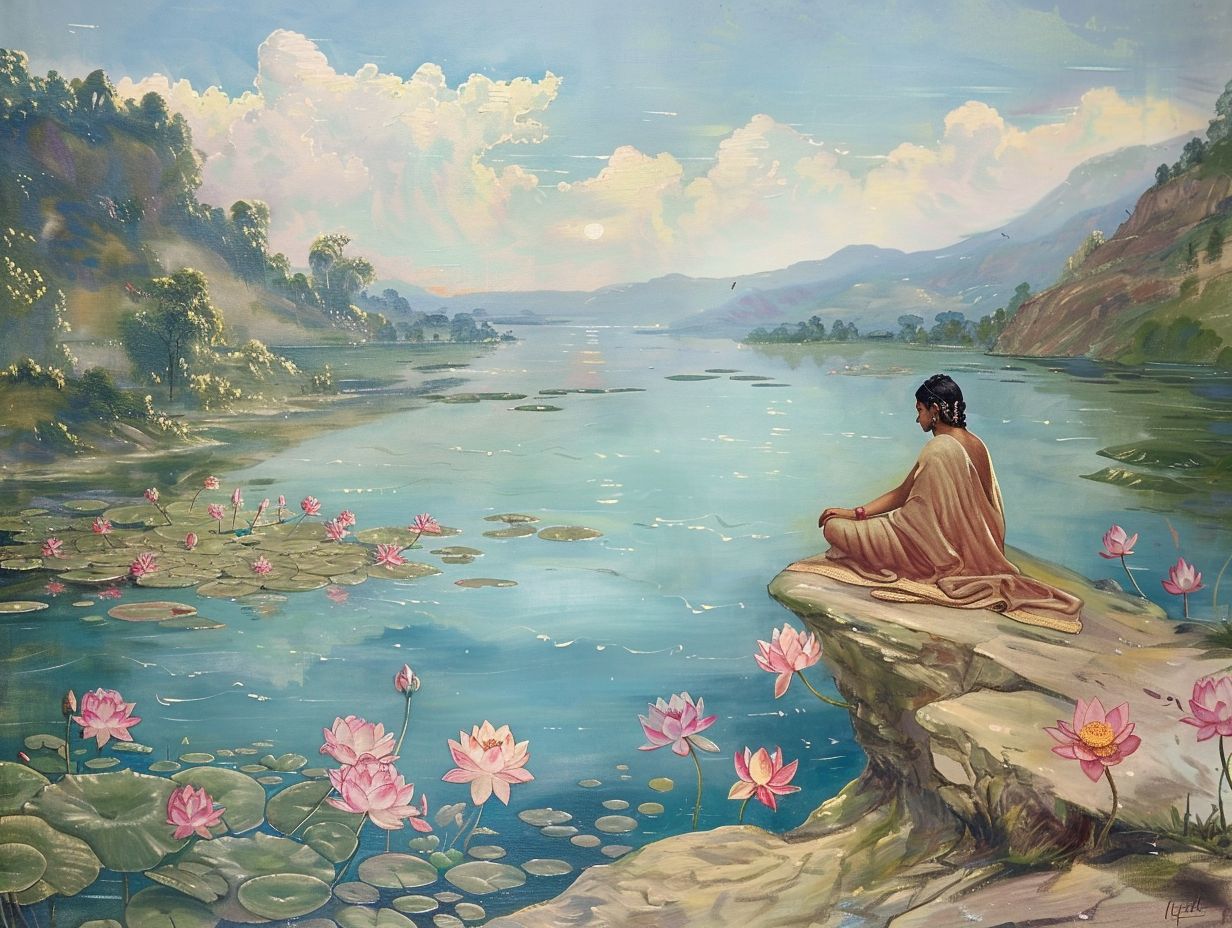Right Action and Desire for Moksha in Mimamsa
Mimamsa, one of the six orthodox schools of Hindu philosophy, presents profound insights into ethical living and the pursuit of liberation. This discourse delves into the concept of Right Action, highlighting its principles and their connection to Dharma, alongside the intricate nature of desire for Moksha.
It carefully examines how these desires diverge, illuminating their pivotal roles in the journey toward spiritual freedom. Furthermore, the exploration reveals the complex relationship between Karma and these foundational principles, ultimately guiding individuals toward a deeper understanding of Mimamsa.
What is Right Action in Mimamsa?

The concept of right action in Mimamsa serves as a cornerstone, highlighting the significance of ethical conduct and ritual practice as founded in the philosophical discourse of the Vedas.
This profound philosophical inquiry delves into the nuanced interplay between intention, moral duty, and the quest for knowledge, ultimately steering practitioners toward a disciplined existence that aligns duty with the aspirational pursuit of moksha.
By immersing themselves in the principles articulated in Mimamsa, individuals are equipped to traverse the complexities of life, gaining insight into how their actions reverberate within the karmic cycle and shape their spiritual odyssey.
What are the Principles of Right Action in Mimamsa?
The principles of right action in Mimamsa are firmly anchored in the ethical conduct delineated by the Vedas, which underscore the significance of intention and the commitment to moral duty. These principles are intricately intertwined with the execution of one s dharma, or duty, a concept deemed essential for the preservation of cosmic order (rita).
For instance, the esteemed text known as the Brahmanas articulates the critical nature of rituals and their ethical foundations, positing that actions performed with sincerity and pure intent yield spiritual benefits and foster harmony within the community. The commentaries of revered scholars, such as Jaimini, illuminate the connection between proper ritual action and ethical motivations, arguing that it is through a profound understanding of the underlying meanings within rituals that individuals can attain both personal and collective well-being.
Thus, the Mimamsa tradition illustrates that the manner in which one fulfills their duties not only satisfies personal responsibilities but also cultivates broader societal values, reinforcing the interconnectedness of individual actions and communal harmony.
How is Right Action Related to Dharma in Mimamsa?
In Mimamsa, the notion of right action is profoundly intertwined with the concept of dharma, embodying the moral duties and ethical conduct necessary for individuals to fulfill their roles within society. This intricate relationship highlights the belief that adherence to one’s dharma not only shapes personal behavior but also cultivates harmony within the broader community.
In this regard, right action becomes the means through which individuals express their commitment to dharma, allowing them to navigate life s complexities with a sense of purpose and integrity. The philosophical implications of this connection reveal a deep interdependence between individual choices and collective well-being, underscoring that the quest for spiritual fulfillment is inherently linked to the ethical dimensions of every action undertaken.
By embracing dharma, an environment is fostered where positive actions resonate throughout society, paving the way toward elevated consciousness and deeper understanding.
What is Desire for Moksha in Mimamsa?
The aspiration for moksha in Mimamsa signifies a deep yearning for spiritual liberation, one that transcends the confines of human experience and the repetitive cycle of samsara. This longing transcends a simple quest for personal gratification; it encapsulates a comprehensive approach to understanding existence and the ultimate reality.
Through the cultivation of this profound desire, practitioners embark on a transformative journey of self-exploration and self-realization, prompting them to grapple with existential inquiries regarding purpose, knowledge, and the very essence of being, all within the rich tapestry of philosophical traditions.
What is the Role of Desire in Mimamsa?

Desire occupies a central position in Mimamsa, serving as a catalyst that propels individuals toward ethical conduct and spiritual aspirations, significantly shaping their decisions and actions.
When desire is harmoniously aligned with one’s responsibilities, it inspires individuals to pursue righteous behavior, fostering personal growth and a profound understanding of moral principles. For instance, a scholar s fervent quest for knowledge not only fulfills their academic duties but also amplifies their capacity to make meaningful contributions to society.
Conversely, unchecked desire may lead to ethical quandaries, where personal ambitions eclipse obligations, resulting in adverse outcomes such as conflict and moral deterioration. This intricate interplay between duty and desire highlights the significance of moral agency, shedding light on the nuances of virtue ethics and how they assist individuals in navigating the often turbulent waters of human motivation.
How is Desire for Moksha Different from Other Desires in Mimamsa?
The desire for moksha stands apart from other desires within the framework of Mimamsa, embodying a profound longing for spiritual awakening and liberation from the relentless cycles of samsara. Unlike the pursuit of transient worldly pleasures, this yearning transcends the superficial cravings for material wealth, social status, or physical gratification, all of which ultimately offer only ephemeral satisfaction.
While such desires may propel individuals toward temporary achievements, the quest for moksha necessitates a deeper level of introspection and a steadfast commitment to renouncing attachment and ego. Within the context of Mimamsa, which emphasizes selfless action and the performance of dharma, the renunciation of lesser desires emerges as a pivotal step on the path to spiritual liberation.
Achieving moksha not only marks the cessation of suffering but also represents a profound alignment with the ultimate truths of existence. This alignment elevates one’s consciousness beyond the confines of mere survival and pleasure, opening the door to a more profound understanding of one s place in the cosmos.
How to Attain Moksha in Mimamsa?
Attaining moksha within the framework of Mimamsa necessitates a disciplined and methodical approach through a range of spiritual practices, including sadhana, meditation, and yoga. These practices serve to cultivate self-realization and foster a profound sense of inner peace.
What are the Methods of Attaining Moksha in Mimamsa?
Methods of attaining moksha in Mimamsa encompass a diverse array of practices, including meditation, yoga, and adherence to ethical conduct, each playing a vital role in spiritual evolution and self-discipline.
These interconnected practices foster a holistic approach to spiritual growth. Meditation serves as a pathway for inner reflection and tranquility, enabling individuals to cultivate focus and awareness while harmonizing the mind and spirit. Conversely, yoga promotes physical discipline and flexibility, which are essential for sustaining prolonged periods of meditation.
Ethical conduct, rooted in the principles of dharma, directs actions in alignment with universal truth, ensuring that spiritual advancement occurs without causing harm. Collectively, these methods establish a harmonious balance, enhancing one’s ability to transcend worldly attachments and ultimately attain the liberation of moksha.
What is the Importance of Right Action and Desire in Attaining Moksha in Mimamsa?

The significance of right action and the yearning for moksha in the pursuit of liberation within Mimamsa cannot be overstated; these two elements are fundamental to an individual’s spiritual aspirations and the overall journey toward enlightenment.
Right action embodies the practical expression of a deeper longing for moksha, steering ethical behavior and decision-making in alignment with spiritual growth. In contrast, a genuine desire for liberation energizes one s commitment to uphold dharma, prompting individuals to consistently engage in righteous deeds.
This harmonious interplay creates a cycle in which ethical actions foster spiritual evolution, while the pursuit of moksha enhances awareness of the importance of these actions. Consequently, an emphasis on both aspects not only strengthens the individual’s dedication to attaining liberation but also enriches their understanding of life’s interconnectedness, ultimately paving the way to experience true freedom.
How Does Mimamsa View the Concept of Karma?
Mimamsa regards the concept of karma as a cornerstone principle that intricately governs the relationship between action and consequence. It underscores the profound moral implications inherent in every decision undertaken by an individual.
What is the Relationship Between Karma and Right Action in Mimamsa?
The relationship between karma and right action in Mimamsa is intricately woven, with ethical conduct playing a pivotal role in shaping the karmic outcomes of an individual’s actions. In this philosophical framework, each decision whether benevolent or harmful contributes to a cumulative karmic ledger that defines future experiences.
Actions that are in harmony with dharma, or moral duty, yield favorable karmic consequences, while those that contravene ethical principles lead to adverse outcomes. This profound understanding of ethical conduct highlights the significance of moral agency, wherein individuals are not mere passive observers; they are active participants in their spiritual journeys.
Ultimately, the Mimamsa perspective invites individuals to critically assess their choices, emphasizing that each intentional act holds substantial weight not only for the individual but also within the expansive tapestry of existence.
How Does Desire for Moksha Affect One’s Karma in Mimamsa?
The aspiration for moksha profoundly influences an individual’s karma within the framework of Mimamsa, as this yearning informs the decisions made and delineates the path of spiritual advancement toward liberation.
This profound longing for liberation acts as a compass, guiding individuals to scrutinize the motivations behind each of their actions. In the realm of karmic philosophy, the significance of their choices transcends mere consequences; it is intricately linked to the purity of their intentions.
When the pursuit of moksha takes precedence, actions tend to align more closely with dharma, fostering a positive karmic cycle. Each decision, propelled by the desire to approach spiritual awakening, accelerates one s journey toward enlightenment, illustrating the deep interconnection of these elements in shaping an individual s spiritual landscape.
Frequently Asked Questions

What is Mimamsa’s view on Right Action and Desire for Moksha?
Mimamsa believes that the ultimate goal of human life is attaining Moksha, or liberation from the cycle of birth and death. This can only be achieved through performing the right actions, guided by the right desires.
What is considered as ‘Right Action’ in Mimamsa?
In Mimamsa, ‘Right Action’ refers to performing prescribed Vedic rituals and duties without any personal desires or attachments. These actions are believed to have the power to bring about Moksha.
How does Mimamsa define ‘Desire for Moksha’?
Mimamsa states that the desire for Moksha is the strong and unwavering longing to be free from the cycle of birth and death. This desire should be the driving force behind all actions, leading one towards the ultimate goal of liberation.
Does Mimamsa believe in renunciation as a means to achieve Moksha?
Yes, Mimamsa advocates for renunciation of worldly desires and attachments as a means to attain Moksha. However, this renunciation should not be mistaken as a rejection of duties and actions, rather it should be seen as a detachment from the fruits of these actions.
In Mimamsa, what role do rituals and Vedic duties play in the path towards Moksha?
Mimamsa believes that rituals and Vedic duties are essential in the path towards Moksha. These actions are seen as a means to purify the mind and soul, paving the way for the attainment of Moksha.
Can one attain Moksha without performing any actions or rituals?
No, according to Mimamsa, the desire for Moksha and the performance of actions and rituals are inseparable. One cannot achieve Moksha without the desire for liberation, and this desire should be manifested through performing the prescribed Vedic duties and rituals.
